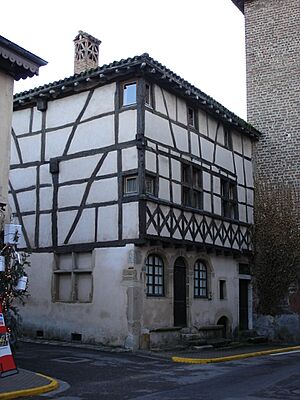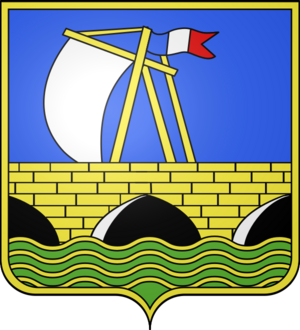Pont-de-Veyle facts for kids
Pont-de-Veyle is a small town, also called a commune, located in eastern France. It is part of the Auvergne-Rhône-Alpes region and the Ain department.
This town is about 10 kilometers east of Mâcon and roughly 400 kilometers from Paris. In 1999, about 1,571 people lived there. Pont-de-Veyle is special because it's built on an island. This island formed where the Veyle River splits into two branches. The Veyle River then flows into the Saône River. The Saône River was once an important border between the Kingdom of France and the German Empire, set up by the Treaty of Verdun in 843.
Contents
History of Pont-de-Veyle
Pont-de-Veyle was first settled by a group of powerful families called the Lords of Bage. It officially became a city in 1275, thanks to the Counts of Savoy. The town didn't become part of France until 1601. This happened under King Henri IV as part of the Treaty of Lyon.
Defending the Town
Because Pont-de-Veyle was so close to the border, it needed strong defenses. A castle was built to protect the town from nearby lords and princes. This castle once had 14 towers! Today, only one tower, called the Clock Tower, and a 14th-century doorway remain. There are also some old brick walls, but not much is left of them. The castle was once surrounded by a moat filled with water. Between 1750 and 1800, many of the old city walls and towers were taken down because they were becoming unsafe.
Historic Buildings
Pont-de-Veyle has many old and beautiful buildings from the Renaissance period and later.
- The "Savoy" or "House of Lords" is one of the most impressive buildings. Its front has been carefully restored.
- There's also a priory (a type of monastery) dedicated to Saint Benedict, with its old Gothic-style doors.
- You can see many half-timbered houses, like "The House of the Watchman." These houses have wooden frames filled with plaster or brick.
- Many buildings feature spiral stone staircases. One of these is in the City Hall, which used to be part of a college run by the Jesuits.
- The Jesuit-style church was built in 1755.
- The local hospital, which first opened in 1322, still uses buildings from the 18th century.
Religious Changes
After the Reformation and the religious wars in Europe, many Protestants lived in Pont-de-Veyle. They had religious freedom because of a law called the Edict of Nantes. However, when this law was later canceled, many Protestants left the city. They moved to countries like Switzerland and Germany to find safety.
Famous Resident
Jean-Louis Carra, a French journalist and important figure in the French Revolution, was born in Pont-de-Veyle on March 9, 1742. He was later executed in Paris on October 31, 1793.
See also
- Ain communes
 In Spanish: Pont-de-Veyle para niños
In Spanish: Pont-de-Veyle para niños



